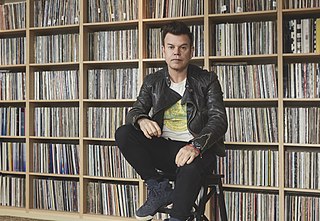A Quote by Joshua Meyrowitz
People are more likely to search for specific books in which they are actively interested and that justify all of that effort of reading them. Electronic images and sounds, however, thrust themselves into people's environments, and the messages are received with little effort. In a sense, people must go after print messages, but electronic messages reach out and touch people. People will expose themselves to information in electronic media that they would never bother to read about in a book.
Quote Topics
About
Actively
After
Book
Books
Bother
Effort
Electronic
Electronic Media
Environments
Expose
Go
However
Images
Information
Interested
Justify
Likely
Little
Media
Messages
More
Must
Never
Out
People
Print
Reach
Reach Out
Read
Reading
Received
Search
Sense
Sounds
Specific
Them
Themselves
Thrust
Touch
Touch People
Which
Will
Would
Related Quotes
Electronic books are ideal for people who value the information contained in them, or who have vision problems, or who like to read on the subway, or who do not want other people to see how they are amusing themselves, or who have storage and clutter issues, but they are useless for people who are engaged in an intense, lifelong love affair with books. Books that we can touch; books that we can smell; books that we can depend on.
People always focus on people like me who use synthesizers, right, which are explicitly electronic and therefore obvious. "Ah, yes, that's electronic music." But they don't realize that so is the concept of actually taking a piece of extant music and literally re-collaging it, taking chunks out and changing the dynamics radically and creating new rhythmic structures with echo and all that. That's real electronic music, as far as I'm concerned.
The songs themselves sometimes have messages and people can read into them different ways, but I try to use concerts as a way to gather people and then have information there. I think that's important to find that balance, a way to be able to turn people on to things at the shows, but also just have it be an entertainment experience for people who just want to hear music and dance and don't want the extra stuff.
I would say the first key concept is that, in terms of technological and communication progress in human history, the Internet is basically the equivalent of electronic telepathy. We can now communicate all the time through our little magic smartphones with people who are anywhere, all the time, constantly learning what they're thinking, talking about, exchanging messages. And this is a new capability even within the context of the Internet.
I'm trying to fly the flag for the days of electronic music where people who are making it are also building the gear because that was what was happening in the very early days of electronic music. And that spirit is one of the things that really appeals to me about electronic music so I'm putting this forward as a way to keep that.
People who need to possess the physical copy of a book, and not merely an electronic version, are in some sense mysteics. We believe that the objects themselves are sacred, not just the stories they tell. We believe that books possess the power to transubstantiate, to turn darkness into light, to make being out of nothingness.
I am a big fan of the electronic book. I hate to see the old bookstores close, but they have to reinvent themselves. I believe the First Edition bookstore will be the next thing. People will read electronically, then decide they want to own that book. The author will then be invited to the old bookstores to sign. I think books will always be with us, but they will fill a different need.































